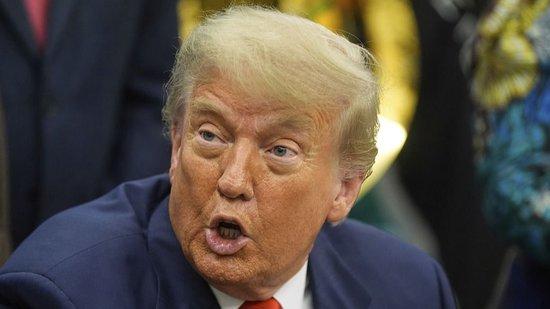
Regarding the executive order by President Donald Trump seeking to limit “birthright citizenship” for children born in the United States, the U.S. Supreme Court recently issued a ruling that delivered an important victory for Trump.
According to Xinhua News Agency, in response to lawsuits filed against the Trump administration’s attempt to restrict “birthright citizenship” through an executive order, the U.S. Supreme Court ruled on June 27 that federal district judges have no authority to issue nationwide injunctions to prevent the implementation of such measures.
As reported by American media, the conservative-controlled U.S. Supreme Court approved the Trump administration’s request with a vote of 6 to 3, limiting the scope of injunctions issued by federal district judges to only apply to states, groups, and individuals filing lawsuits. The court decided to postpone the implementation of Trump’s executive order restricting “birthright citizenship” for at least 30 days and referred the related cases back to lower courts to assess the practical impact of this ruling.
Trump described it as a “major victory” on social media. American media believe that this ruling is favorable for the Trump administration to gradually take steps to end “birthright citizenship.” However, the ruling did not address whether the executive order restricting “birthright citizenship” itself violates the constitution.
President Trump has claimed a “victory,” while families face “uncertainty.”
The “birthright citizenship” policy has a history of over a century in the United States, ensuring that all people born in the country are citizens regardless of their parents’ status. On his first day in office on January 20th this year, Trump signed an executive order to repeal “birthright citizenship,” stating that newborns of non-citizens or legal permanent residents cannot automatically obtain U.S. citizenship.
Federal district court judges in Maryland, Washington, and Massachusetts among other states issued nationwide injunctions to prevent the effectiveness of this executive order. Following this, the Trump administration urgently requested the U.S. Supreme Court to rule on whether federal district judges have “judicial jurisdiction” to issue nationwide injunctions.
The Supreme Court’s decision on the 27th was led by conservative justices, with liberal justices opposing. Justice Amy Coney Barrett, representing the majority, wrote the opinion stating that a nationwide ban might exceed the power granted to federal courts by Congress. She noted that judges’ decisions should be limited to the individual or organization of the plaintiff.
Liberal justice Sonia Sotomayor read her dissent in court, describing the decision as “a misinterpretation of the law,” ignoring the illegality of Trump’s ban, and warned that it would “create chaos for the families of all affected children.”
Legal experts have analyzed that Trump’s ban violates the Fourteenth Amendment, historical precedents, and the traditional American constitutional framework. However, the Supreme Court did not directly decide on the constitutionality of Trump’s “birthright citizenship ban.”
“This ruling means that families across the country will continue to live in uncertainty, even if their children are born in the United States, they do not know whether they will be recognized as U.S. citizens,” stated Attorney General of Maryland, Anthony Brown, in a statement.
Trump welcomed the court’s decision on the 27th, saying, “We can now move forward with many policies that were wrongly halted nationwide.” He mentioned that aside from “birthright citizenship,” the government will also seek to reinstate funding support for asylum-seeking cities, suspend refugee resettlement, freeze “non-essential” expenses, and prohibit federal funding for transgender surgeries.
Since taking office again in January 2025, Trump has won consecutive victories in the Supreme Court’s “Emergency Review Process.” This week earlier, the court allowed him to deport specific immigrants to a third country.
The ruling on the 27th could have a profound impact on Trump’s second term as president, even if the “birthright citizenship” executive order was ultimately not enforced, limiting the court’s power to revoke presidential policies in the future.
Although the Supreme Court ruled that the original nationwide ban was invalid, it retained the possibility of seeking a nationwide ban through class action lawsuits.
Hours after the ruling was issued on the 27th, advocacy organizations for immigrant rights, such as CASA, submitted amended complaints in federal courts in Maryland, requesting a nationwide class action against the case, representing pregnant women or newborns from all families without legal status in the United States.
The American Civil Liberties Union (ACLU) also filed another nationwide class action in a federal court in New Hampshire, representing babies born to parents deprived of citizenship under Trump’s executive orders.
If the class action is successful, it could temporarily halt a policy, potentially leading the case back to the Supreme Court. Moreover, states across the US are continuing their fight, with 22 states and the District of Columbia joining the birthright citizenship lawsuit. Lawyers representing these states argue that Trump’s executive orders violate the Constitution and will force them to bear the “destructive” burden of enforcing the policies. They also claim that this policy will result in them losing income from the federal government for providing medical assistance and other public benefits to some children.
Trump’s birthright citizenship ban is just one part of his significant tightening of immigration policies. He also banned entry to travelers from over ten countries, accelerated deportation of Venezuelan gang members, suspended refugee admissions, and attempted to cancel legal protections for more than 530,000 immigrants.